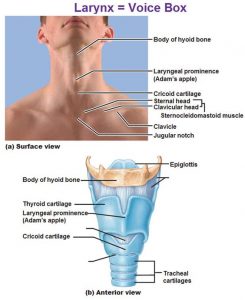So, bear with me here, our voices changing as we get older is completely normal, but we need to walk through a few things first.
Here’s something interesting you may not know.
Fact #1
With proper training throughout adult life, the voice should actually be reaching it’s peak LATER in life (say, around 50) and NOT earlier in life (e.g. where most people start to struggle, around 25-30).
Why? Let’s explore this…
Fact #2
– The physiology of the larynx and the vocal apparatus changes over time. Ongoing training helps combat the negatives of these changes, and take advantage of benefits of getting older.
Wait… benefits? What benefits?
Fact #3
– As you get older, the larynx drops bit by bit. This imparts additional bottom end to your tone – relatively straightforward to grasp.
Fact #4
– The various cartilages in the larynx and vocal apparatus start to ossify… i.e. turn to bone.
That’s why things seem to get less agile and flexible as you get older in relation to singing – that’s because things DO become less flexible as you get older. That’s what makes this fourth fact particularly interesting. What this means is that the previously flexible cartilages that make up the housing of the vocal cords, that they are tensioned on and controlled by, start to harden and become stiffer and less flexible.
The first negative that comes along with this is that whilst you are young you may find you can sound great IN SPITE of great resistance in your singing, manipulation, etc, but as you get older, you’ll find things getter tougher and tougher, as if you are fighting your own voice to do the things you used to. People say this is just a reality of getting older, but actually correct technique from youth has the OPPOSITE effect, instead of negative it’s positive.
Rigidity is your friend
When the singing apparatus (i.e. your voice) becomes more rigid as a structure through the ossification process, the muscles are now acting on a physically much stronger structure than they were before. Provided singing is being done with correct technique and not just jamming the voice as hard is it will go (as is often the case and doable in youth), this extra rigidity makes things easier to achieve a more powerful and acoustically resonant tone.
Check this quote from leading voice scientist Ingo Titze – “certain age-related deteriorations may actually be beneficial to the larynx as a sound-producing instrument… We might speculate that a partially ossified laryngeal framework can better support the tension of the vocal folds because bone tends to deform less than cartilage under the same stress. Comparing the vocal folds to vibrating strings, it seems important to maintain rigid endpoints for tissue fibers to vibrate in simple predictable modes.”
And a further quote from an article within Link 2 provided below – “Although the voice itself remains stable, physiological changes do occur in middle age, most significantly ossification (hardening) of the laryngeal cartilages. In some individuals, these changes can actually improve the singing voice, since a more bony support framework in the larynx better supports the tension in the vocal folds. If you compare the voice to a piano, for instance, the strings in a piano are attached to solidly-anchored metal posts at each end. This allows the piano strings to stay in tune and make a predictable sound. At younger ages when flexible cartilage supports the vocal folds, there is a greater chance for unpredictability, but with stiffer, more bony supports, it is logical that the voice could perform more reliably.”
Conclusion
Getting older is a natural part of life, but in relation to singing, this is actually GOOD news, if you’re willing to invest in your voice of course. Don’t fight it, instead, work on your technique. To someone with ongoing technical growth, these changes are beneficial – to those who are just trying to repeat what they did in their youth, these changes are not beneficial. You’re just going to struggle and your voice is going to keep getting weaker and more of a beast to wrestle than a thing of great joy as it once was. The changes are going to happen all the same, it’s your choice whether they help you or hinder you.
If this has grabbed your attention and is particularly relevant to you, why not get in touch and explore what this means for your own voice?
You can get in touch and book your first session right here.
Learn More: Related Articles
If you’d like to learn more about the voice and how it changes as it gets older, you may enjoy these related articles:
The perks of being an older singer
Why can’t I sing as high as I used to?
Vocal Tessitura
Maturing of Vocal Tone
How long does it take to train a voice?


